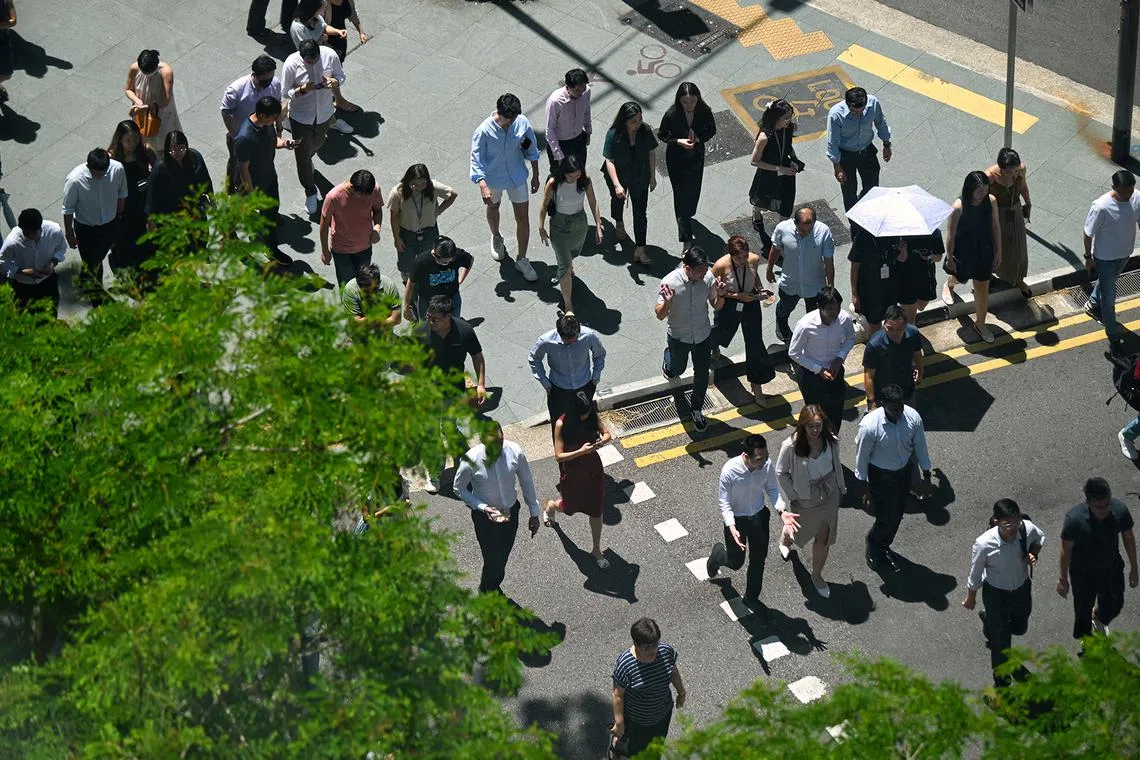Racial discrimination at work has fallen, but minorities continue to face more prejudice: IPS study
Sign up now: Get ST's newsletters delivered to your inbox

At the workplace, overall reported experiences of discrimination have decreased, a report on the IPS study released on Feb 3 said.
PHOTO: ST FILE
SINGAPORE – Singaporeans reported lower levels of racial discrimination at work, though minorities continued to experience more of such incidents than the majority Chinese ethnic group, a study has found.
A 2024 study by the Institute of Policy Studies (IPS), in collaboration with racial and religious harmony non-governmental organisation (NGO) OnePeople.sg, found that 18.4 per cent of Malays and 16.7 per cent of Indians reported feeling racially discriminated against in a job application or job promotion.
This is down from over a quarter of each group reporting this in the 2018 and 2013 versions of the survey, each of which analysed responses from 4,000 Singaporeans.
In comparison, 3.7 per cent of Chinese said they experienced such discrimination, down from 4.1 per cent in 2018 and 5.7 per cent in 2013.
Chinese Singaporeans were also less likely to report feeling discriminated against at work than minorities, although the frequency of such discrimination has fallen across the board for all ethnicities since the 2018 iteration of the study.
Around 6 per cent of Chinese Singaporeans reported feeling racial discrimination sometimes, often, or very often or always at work, compared with 23.7 per cent of Malays, 23.4 per cent of Indians, and 20.6 per cent of those classified as “Others”.
This is down from the 2018 results, which had 10.7 per cent of Chinese respondents reporting such discrimination, compared with 35.3 per cent of Malays, 32.2 per cent of Indians, and 17.7 per cent of those classified as “Others”.
At the workplace, overall reported experiences of discrimination had decreased, a report on the study released on Feb 3 said.
It added that 7 per cent of respondents indicated that they faced discrimination regarding getting a job or a job promotion in 2024, compared with 9.3 per cent in 2018.
Among those who reported discrimination in the workplace, the most common forms included language use by others that excluded respondents from conversations, which was cited by 57.7 per cent.
Separately, 47.7 per cent perceived that people from other races were being promoted because of their race, and not their qualifications.
At a press conference on the study’s results held at OnePeople.sg’s headquarters in Toa Payoh on Feb 3, OnePeople.sg management committee member Leonard Lim said workplace discrimination is a persistent issue that the NGO will do more to work on.
He said: “As the survey points out, there are pockets of workers and minorities, especially, who feel discriminated against or made fun of because of their race, and insulted because of their race.”
Mr Lim cited as an example of the NGO’s work its workplace diversity programme, where participants use gaming tools to engage in dialogue with religious practitioners and have conversations to tackle racial discrimination at work.
OnePeople.sg chairman Janil Puthucheary said that tackling the problem requires not just legislation – such as the Workplace Fairness Bill passed in January 2025 protecting workers from discrimination, including racial discrimination – but also companies thinking through some of these issues.
Dr Janil, who is also Senior Minister of State for Digital Development and Information and Health, said: “I think what we are doing with workplace diversity and partnership with our community partners complements the Government’s efforts and the legislative efforts to improve the workplace.
“We need all these different things – this aspiration as a society, we need the legislative tools, and we also need capability development organisations.”
The study also found some generational differences in perceptions on how hard different ethnic groups have to work to succeed in Singapore, although overall, seven out of 10 said there was no major difference between the major racial groups.
The overall result was largely consistent with the 2018 and 2013 iterations of the study.
In 2024, older respondents were more likely to think that Singaporeans of the four major races put in as much effort as others to have a basic decent life in Singapore, while younger Singaporeans were more likely to say that Singaporean Chinese and Eurasians need to put in less effort while Singaporean Malays and Indians need to do more, the study said.
When it came to perceptions of possible racial differences in reaching top positions, older respondents were also more likely to say that Singaporean Chinese, Malays and Eurasians need to work as hard as others, the survey found.
But younger respondents were more likely to say Singaporean Chinese and Eurasians have to work less hard, while Singaporean Malays need to work harder.
Responding to this, IPS’ principal research fellow and the head of its Social Lab, Dr Mathew Mathews, who was one of the study’s authors, said this phenomenon is possibly due to more awareness among younger people of the discrimination and barriers facing minorities.
He said: “People are becoming more and more aware about those issues.
“If you look at it overall, I think there’s a shift and we are seeing that some of those (discriminatory) structures have been reduced over time.”
But there are some who still see such structures and want to reflect the fact that these structures might be weighing more on individuals of minority backgrounds, he said.



